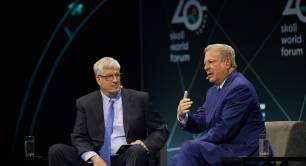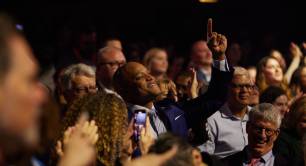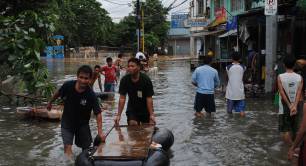Jacinda Ardern at Skoll 2024: ‘Hope dies when we lose our sense of expectation’
The former New Zealand president shares her advice on leadership and creating positive change with the audience at this week’s 21st Skoll World Forum, alongside climate justice campaigner Mary Robinson and Brazilian indigenous leader Sonia Guajajara.
World-famous women leaders were among the star-studded line-up at this week’s Skoll World Forum, one of the biggest global social entrepreneurship events that gathers changemakers, artists and activists to collaborate on social change.
Jacinda Ardern, former prime minister of New Zealand, Mary Robinson, climate justice leader and former UN human rights commissioner, and Sonia Guajajara, Brazil’s first ever minister for indigenous people were among those addressing hundreds of social entrepreneurs, philanthropists and activists on Wednesday.
This year marks the 21st Skoll World Forum, with 1,550 people attending in person in Oxford, England. High-profile speakers scheduled to appear on Friday include the human rights lawyer and Hollywood actor couple, Amal and George Clooney, representing the Clooney Foundation for Justice.
At Wednesday’s opening ceremony Ardern shared her experience of being plunged into New Zealand’s top job aged just 37, despite her initial reluctance to take over as Labour party leader. When that proposal was first put to her, “I almost projectile-vomited”, she admitted.
While she had never believed her gender would hold her back from positions of power – New Zealand had already had two female prime ministers – she thought her personality would. “I was a crier, I was a hugger, I was very sensitive. And I thought: ‘that is not a set of traits you want to take into the blood sport of politics’.”
But she quickly showed that kindness had a place in politics. Her campaigning approach was, she explained, borrowing a rugby term, to “play the ball, not the man… we’re not going to attack the person, we’re going to debate the issue”.
On my first day in office as prime minister, I said I wanted us to be known for kindness – Jacinda Ardern
“Then, on my first day in office as prime minister, [I said] I wanted us to be known for kindness,” she said. While not everyone stuck with this, the advantage of being a “reluctant leader” was that she herself had no inclination to change. “That meant I was able to be a human first, and a leader second, and I stuck with it all the way through.”
Lifelong imposter syndrome turned out to be a strength, Ardern reflected, since it prompted humility and a willingness to seek out experts and to become well informed. Because she had “swotted” up on issues, she was then ready to be decisive when the time came.
- Don’t miss next week’s SE100 Social Business Coffee Break: ‘How to Crush Imposter Syndrome’
High expectations
Among Ardern’s achievements was establishing the ‘Christchurch Call’, a swift, collaborative response to the 2019 terror attack against two mosques in which the attacker live-streamed his actions via Facebook. The initiative quickly secured the backing of other national governments – 130 to date, tech companies and civil society organisations around the world, to work together to eliminate terrorist and violent extremist content online.
While in office Ardern appointed the most diverse cabinet in her country’s history, passed legislation to decriminalise abortion, and was widely praised for her leadership during the Covid-19 pandemic.
Asked to share her advice with the audience, Ardern at first said: “I don’t really feel like this is a room of people I should preach to, you’re all doing amazing things.”
After that, she suggested considering succession planning, even from day one in the job. “Thinking about what’s next will also be critical to giving yourself permission to go when the time is right,” she said. Ardern resigned in an unexpected announcement in January 2023, saying she “no longer had enough in the tank to do the job”.
She also urged them to maintain high expectations. “Your expectation that political figures do better, your expectation that people keep showing up, your expectation that you can create change if you organise and collaborate and work together. The moment we lose our sense of expectation, that is when hope dies.”
Reinstating indigenous rights
Also speaking on Wednesday was Sonia Guajajara, who was appointed Brazil’s first ever minister for Indigenous peoples in 2023, following what she called a “very turbulent period of attacks and dismantling of rights of Indigenous people”.
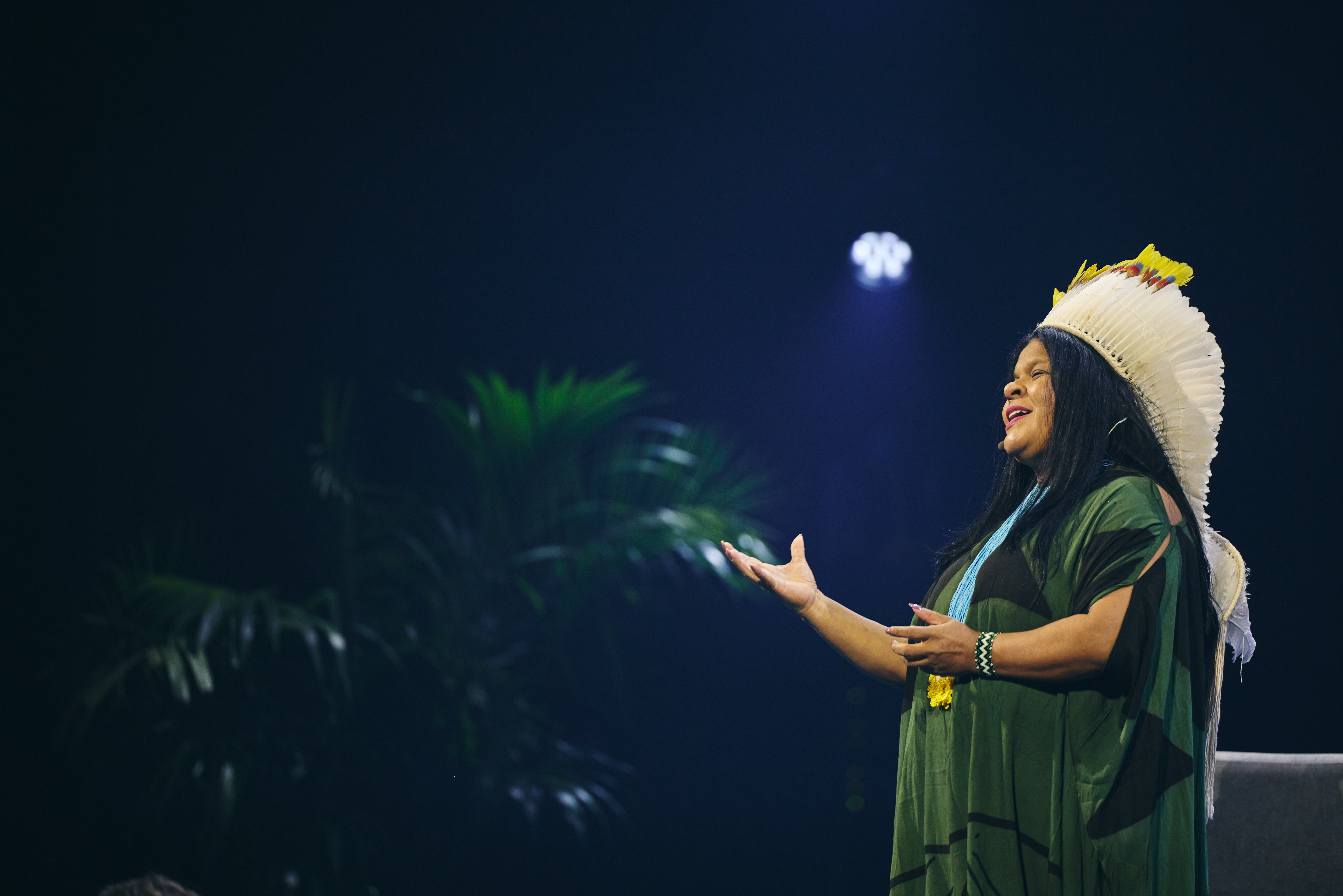
Indigenous people made up just 5% of the world’s population, but protected 82% of its biodiversity, Guajajara said, and one of her priorities was the demarcation of Indigenous land as a way of combatting the climate crisis.
“We need to look towards the Amazon and other biomes and pay attention to the cultural diversity of peoples and territories that already exist. Many peoples are paying with their own lives to ensure that the forest remains standing,” she said, speaking via an interpreter.
The next UN climate summit, COP30, takes place in Brazil in 2025. “We want to make sure that we have the best and the largest Indigenous participation in the history of environmental agreements, with Indigenous women playing a leading role,” she said.
Leadership lacking
Women like Ardern and Guajajara appeared to be outliers amid a gloomy picture of politics today.
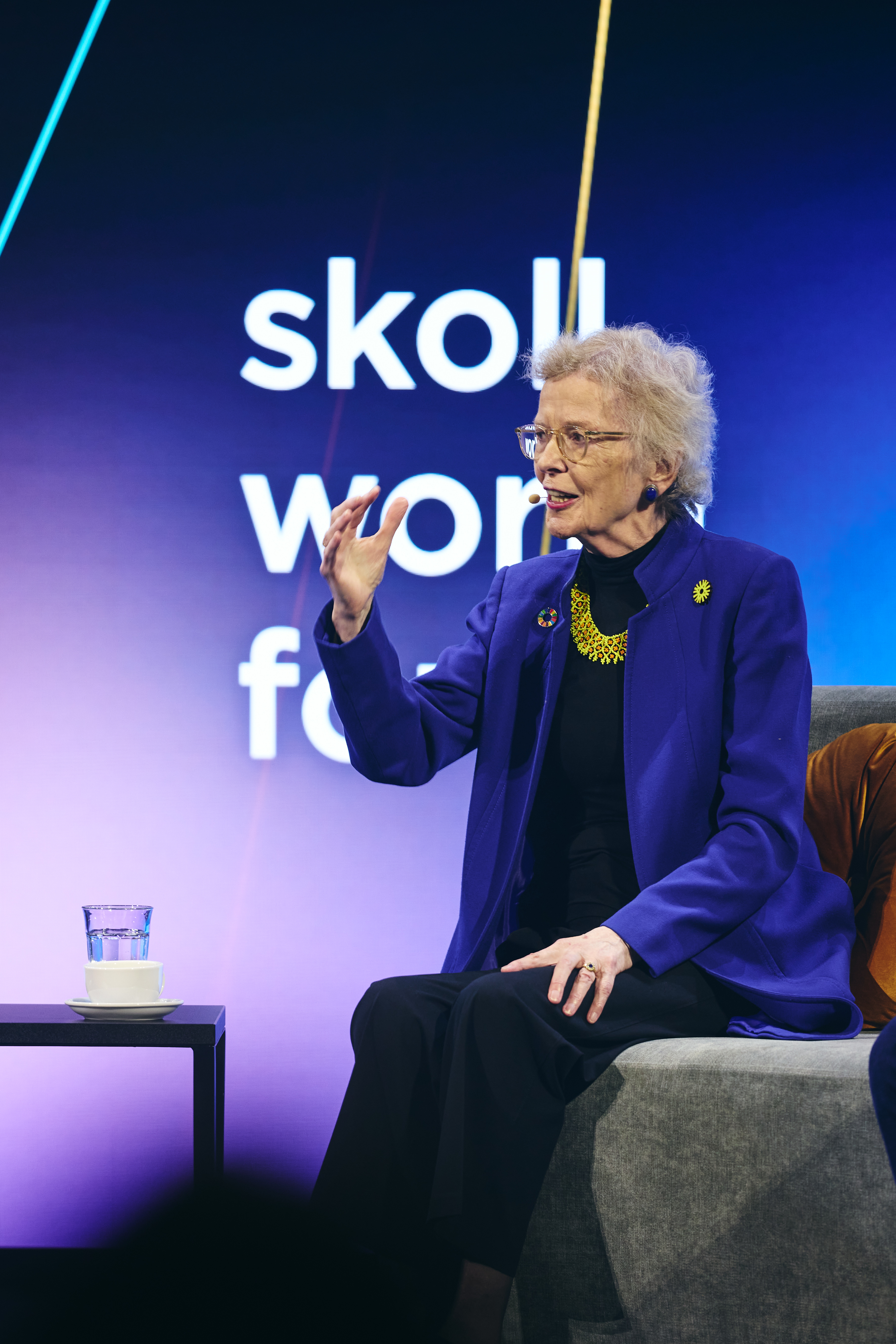 “Fair, honest, consistent leadership” was sorely lacking, according to Mary Robinson (pictured), the first female president of Ireland, UN High Commissioner for Human Rights from 1997 to 2002, and current chair of The Elders, a group of independent leaders working together on peace and human rights.
“Fair, honest, consistent leadership” was sorely lacking, according to Mary Robinson (pictured), the first female president of Ireland, UN High Commissioner for Human Rights from 1997 to 2002, and current chair of The Elders, a group of independent leaders working together on peace and human rights.
“I think the world has got progressively more difficult for every high commissioner… and is now at its most difficult,” she said.
Robinson’s words were echoed by fellow Elders member and veteran multilateral diplomat Zeid Ra’ad Al Hussein, who condemned the “stupidity” of national leaders who were violating the rules of the game “with ever greater frequency”. It was, he said, as if the star footballers in a Premier League match were constantly fouling yet no one paid any attention to the referee.
But, pointing to recent wins for democracy in Poland and Turkey, Ra’ad Al Hussein said “deep pessimism” could turn into “a mild optimism that things can happen, and so we see-saw between these feelings”.
Although reluctant to offer advice on how to create change to the Skoll World Forum audience – people who she said had “incredible wisdom and determination” – Robinson said we could all benefit from connecting more with each other.
“It’s not enough to be doing it alone any more, and thinking, ‘I’m making my contribution’. No, we’ve got to connect. And we’ve got to know our power. And then we've got to shift the money.”
Images courtesy of the Skoll Foundation
Thanks for reading our stories. As an entrepreneur or investor yourself, you'll know that producing quality work doesn't come free. We rely on our subscribers to sustain our journalism – so if you think it's worth having an independent, specialist media platform that covers social enterprise stories, please consider subscribing. You'll also be buying social: Pioneers Post is a social enterprise itself, reinvesting all our profits into helping you do good business, better.

